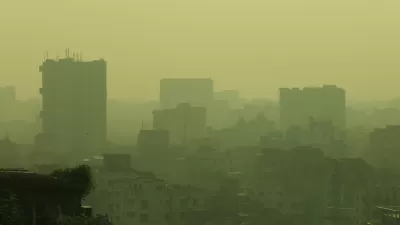Air pollution is more likely to take years life off the lifespan of the average human than any other external factor, according to a recent report out of the University of Chicago.

Air pollution is the most significant public health threat on the planet, according to the most annual Air Quality Index report by the Energy Policy Institute at the University of Chicago (EPIC). According to the report, just meeting the World Health organization’s guideline limits for fine particulate pollution would add 2.3 years to the expected lifespan of the average individual.
An article by Issam Ahmed for Phys.org provides more details from the study, noting that pollution from vehicles, industry, wildfire, and more contributes to lung disease, heart disease, strokes, and cancer.
“Asia and Africa bear the greatest burden yet have some of the weakest infrastructure to deliver citizens timely, accurate data,” writes Ahmed. “They also receive tiny slices of an already small global philanthropic pie.”
Among the countries facing the worst air pollution in the world, Bangladesh, India, Nepal, and Pakistan top the list. The article also notes that China as made significant progress in improving its air quality. “Its air pollution dropped 42.3 percent between 2013 and 2021. If the improvements are sustained, the average Chinese citizen will be able to live 2.2 years longer,” reports Ahmed.
In the United States, wildfires are significantly worsening air quality in parts of the country. “For example, California's historic wildfire season of 2021 saw Plumas County receive an average concentration of fine particulate matter more than five times over the WHO guideline,” according to Ahmed.
FULL STORY: Air pollution greatest global threat to human health, says benchmark study

Trump Administration Could Effectively End Housing Voucher Program
Federal officials are eyeing major cuts to the Section 8 program that helps millions of low-income households pay rent.

Planetizen Federal Action Tracker
A weekly monitor of how Trump’s orders and actions are impacting planners and planning in America.

Ken Jennings Launches Transit Web Series
The Jeopardy champ wants you to ride public transit.

Rebuilding Smarter: How LA County Is Guiding Fire-Ravaged Communities Toward Resilience
Los Angeles County is leading a coordinated effort to help fire-impacted communities rebuild with resilience by providing recovery resources, promoting fire-wise design, and aligning reconstruction with broader sustainability and climate goals.

When Borders Blur: Regional Collaboration in Action
As regional challenges outgrow city boundaries, “When Borders Blur” explores how cross-jurisdictional collaboration can drive smarter, more resilient urban planning, sharing real-world lessons from thriving partnerships across North America.

Philadelphia Is Expanding its Network of Roundabouts
Roundabouts are widely shown to decrease traffic speed, reduce congestion, and improve efficiency.
Urban Design for Planners 1: Software Tools
This six-course series explores essential urban design concepts using open source software and equips planners with the tools they need to participate fully in the urban design process.
Planning for Universal Design
Learn the tools for implementing Universal Design in planning regulations.
Ada County Highway District
Clanton & Associates, Inc.
Jessamine County Fiscal Court
Institute for Housing and Urban Development Studies (IHS)
City of Grandview
Harvard GSD Executive Education
Toledo-Lucas County Plan Commissions
Salt Lake City
NYU Wagner Graduate School of Public Service





























